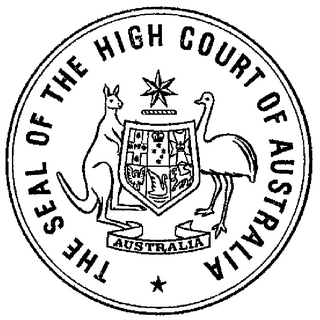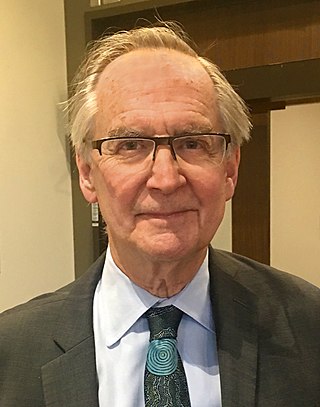Related Research Articles

The Judicial Committee of the Privy Council (JCPC) is the highest court of appeal for the Crown Dependencies, the British Overseas Territories, some Commonwealth countries and a few institutions in the United Kingdom. Established on 14 August 1833 to hear appeals formerly heard by the King-in-Council, the Privy Council formerly acted as the court of last resort for the entire British Empire, other than for the United Kingdom itself.

The High Court of Australia is the apex court of the Australian legal system. It exercises original and appellate jurisdiction on matters specified in the Constitution of Australia and supplementary legislation.

The Caribbean Court of Justice is the judicial institution of the Caribbean Community (CARICOM). Established in 2005, it is based in Port of Spain, Trinidad and Tobago.

William Ian Corneil Binnie is a former puisne justice of the Supreme Court of Canada, serving from January 8, 1998 to October 27, 2011. Of the justices appointed to the Supreme Court in recent years, he is one of the few appointed directly from private practice. On his retirement from the Court, he was described by The Globe and Mail as "arguably the country's premier judge", by La Presse as "probably the most influential judge in Canada of the last decade" and by the Toronto Star as “one of the strongest hands on the court.”

The Gun Court is the branch of the Jamaican judicial system that tries criminal cases involving firearms. The court was established by Parliament in 1974 to combat rising gun violence, and empowered to try suspects in camera, without a jury. The Supreme Court, Circuit Courts, and Resident Magistrate's Courts function as Gun Courts whenever they hear firearms cases. There is also a Western Regional Gun Court in Montego Bay. Those convicted by the Gun Court are imprisoned in a dedicated prison compound at South Camp in Kingston. Until 1999, the Gun Court sessions were also held in the same facility.

The Judiciary of Barbados is an independent branch of the Barbadian government, subject only to the Barbadian Constitution. It is headed by the Chief Justice of Barbados. Barbados is a common law jurisdiction, in which precedents from English law and British Commonwealth tradition may be taken into account.
The Supreme Court of Judicature of Belize is one of three types of courts in Belize, the lower ones being the Magistrate's Courts and the Court of Appeal. It is a court of original jurisdiction in both civil and criminal cases as well as an appellate court. It is governed by the Supreme Court of Judicature Act (SCJA).
John Harris Byrne is a retired Australian jurist who previously served as Senior Judge Administrator of the Supreme Court of Queensland. Having been a judge of that court since 1989, he was one of the court's most experienced judges. He was also Chair of the National Judicial College of Australia, a body which provides programs and professional development resources to judicial officers in Australia. He is now a private Commercial Arbitrator.
Justice Henry George Fryberg was a Justice of the Supreme Court of Queensland, Australia.
Fraser v Her Majesty's Advocate (2011) UKSC 24 is a decision of the Supreme Court of the United Kingdom relating to the effect of non-disclosure of evidence to the defence at trial and the role of the Supreme Court of the United Kingdom in Scots criminal law.
The Norman Manley Law School is a law school in Jamaica.
George Bawa Singh was a Belizean judge who served as Chief Justice of the Supreme Court in 1998 and as a Puisne Justice of the Supreme Court from 1991 to 1998. He previously served as Solicitor General and Director of Public Prosecutions.
Sir George Noel Brown was the Chief Justice of the Supreme Court of Belize from 1991 to 1998, the second native-born Belizean to sit in that position.
Samuel Lungole Awich is a Commonwealth jurist, whose career has taken him from his native Uganda to Botswana, the Solomon Islands, and for the past decade Belize.
The Attorney-General of Belize is a cabinet-level official who acts as the principal legal adviser to the government of Belize.
The Director of Public Prosecutions is the head prosecutor of Belize, whose role is to prosecute criminal offences..
Lutchman Sooknandan is a Guyanese-Belizean lawyer. He previously served as Belize's Director of Public Prosecutions, practices law privately at Sooknandan's Law Firm, and serves as Guyana's honorary consul in Belize.
Chayben Abou-Nehra, also referred to as Ben Bou-Nahra, was a Belizean businessman. He had a variety of business activities, including as a 10% shareholder in Miles Tropical Energy, which had various petroleum concessions off the coast near Dangriga. He was a controversial figure both in life and in death. Charged with manslaughter after killing a man in September 2005, he absented himself from Belize at a time when the charges were upgraded to murder, returned when the charges were downgraded to manslaughter, and then walked free in 2007 when witnesses against him refused to testify. Late the following year he was found dead in his hotel room of a gunshot wound, in what may have been a suicide.
Kirk Brian Anderson is a Caribbean jurist. A dual national of Jamaica and Belize, he has experience both before the bench and behind it, in Belize as Director of Public Prosecutions and in Jamaica as a justice of the Supreme Court, and in both countries as a lawyer in private practice.
Blueford v. Arkansas, 566 U.S. 599 (2012), was a decision of the Supreme Court of the United States that clarified the limits of the Double Jeopardy Clause. The Supreme Court held that the Double Jeopardy Clause does not bar retrial of counts that a jury had previously unanimously voted to acquit on, when a mistrial is declared after the jury deadlocked on a lesser included offense.
References
- 1 2 "Meet The Judges". Attorney General of Belize. Archived from the original on 2012-02-04. Retrieved 2012-04-19.
- 1 2 "When is a judge not a judge?". The Reporter. 2009-06-19. Retrieved 2012-04-19.
- ↑ "Barrow Hacks Belize's Justice System". The National Perspective. 2011-07-24. Retrieved 2012-04-19.
- ↑ "Fate of Justice Samuel Awich to be discussed at Bar meeting". News 5 Belize. 2009-09-29. Retrieved 2012-04-20.
- ↑ Humes, Aaron (2010-07-23). "Privy Council substitutes manslaughter for murder in case of Kirk Gordon". Amandala . Retrieved 2012-04-19.
- 1 2 "Is he, or ain't he? Court of Appeal will determine status of Justice Traodio Gonzalez". The Reporter. 2009-03-18. Retrieved 2012-04-19.